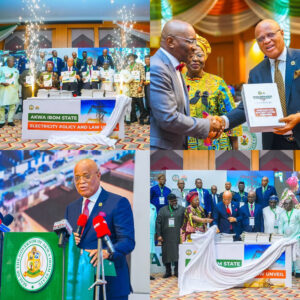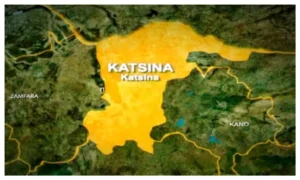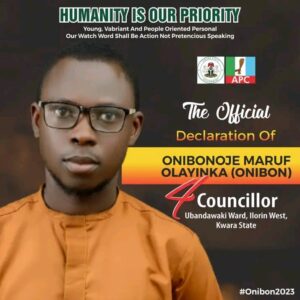Speech of Asiwaju Adegboyega Awomolo, SAN at the Democracy Day Public Lecture held at Osogbo on Sunday 12th day of June 2022
The title of this lecture is “June 12” Twenty Nine Years After, Interrogating Nigeria’s Democracy in the 4th Republic, Osun State in Perspective”
I want to thank the organizers of this lecture for chosing me as the Chairman of this memorial gathering. I thank God that our Royal Father, H.R.M Oba Omowonuola Oyeyode Oyesosin, the Ogiyan of Ejigbo Land, who was one of the dependable fathers of Osun State, is here as the Royal father of the day. The tittle of this lecture is most apposite and so I congratulate everyone here. Permit me to congratulate His Excellency, the Governor of Osun State, Governor Adegboyega Oyetola for this great gathering and to publicly thank him for his love and sacrifices for Osun State. May your labour not be in vain.
Today, the people of Nigeria officially celebrate the date “12th June” as “the Democracy day”. The date replaced “29th May” which was the date the Constitution of the Federal Republic of Nigeria 1999 became effective. It was the date when the elected political office holders of the 4th Republic started their term of office in 1999.
The President of the Federal of Nigeria, President Muhammadu Buhari in his address this morning reminded Nigerians of the importance of democracy in our country.
Let me refresh our memory that on 12th Day of June 1993 Nigerians – irrespective of ethnic, religious, class, and regional affiliations – defied bad weather to freely elect their President with the hope of ending years of military dictatorships.
However, events preceding the June 12, 1993 elections had raised doubts about the seriousness of the military to return to barracks as the Babangida administration came under serious criticisms by human rights and pro-democracy communities.
This was because the transition programme of the military dictatorship had become interminable and endless; the deceptive dictator had lied his way through several postponements, thus by the time of the commencement of this particular phase of the endless transition, the general populace, including elements of the ruling elite, had long ceased to trust or believe the dictator; particularly after the series of banning which excluded the leading political elites from the transition process.
Osun State was created in August 1991 and the 1st democratically elected Governor, Alhaji Isiaka Adetunji Adeleke took his oath of office as the 1st civilian Governor of the new Osun State. The House of Assembly of Osun State elected Rt. Hon Wale Afolabi as its first speaker of the House of Assembly and Hon. Justice Akin Apara was the 1st Chief Judge of the State.
I was the first Attorney-General and Commissioner for Justice of the State. The democratically elected Government of Osun State was about 18 months only when the June 12 Presidential election took place.
Osun State Government came by and was under the flag of Social Democratic Party (SDP). The political leadership of the State was deeply involved in the Presidential campaign because the candidate of SDP was Chief M.K.O Abiola.
I made bold to say that the people of Osun State had great expectations from the Government of Bashorun M.K.O Abiola if he eventually became the President. They had hope that the painful denials suffered in the hands of their senior sister state (Oyo) will be restored. It was the dream of the people that Osun State will be a leading light for other States in the Federation being the cradle of Yoruba race.
When Nigerians trooped out to vote for the two candidates-Bashorun Moshood Kasimawo Abiola and Alhaji Bashir Tofa- fielded by the two registered political parties, (the Social Democratic Party and National Republican Convention) (NRC), respectively, it was with a heave of relief and with the expectation of liberation from a long period of military rule. While Abiola picked ex-diplomat and former Chairman of the party from the north-east, Baba Gana Kingibe, as his running mate, Tofa settled for Sylvester Ugoh, a Christian from the south-east, thereby creating a regional and religious balance.
Abiola was a businessman, publisher, politician, and aristocrat of Yoruba descent. He made his fortune through various enterprises, including communication, oil, and gas. He made his first, unsuccessful run at the presidency in 1983. By then, Nigeria had endured a great deal of political upheaval since its 1960 independence.
As election day drew near, some pro-democracy activists began to warn of some sinister moves by the military ruler to truncate the election, but the Babangida administration insisted the election would certainly hold.
However, the plot thickened, on June 10, 1993, when an organization with ties to the military, Association for a Better Nigeria(ABN) – led by Chief Arthur Nzeribe – obtained a high court orders of injunction against the holding of the election based on alleged corruption of the process by political actors (though unnamed).
USING COURT TO SCUTTLE PEOPLE’S MANDATE
The judge, Justice Bassey Ikpeme (now late) did not hesitate in granting an Order of injunction on June 10, two days to the holding of the election restraining the holding of the National Election. Before this suit, the Association for Better Nigeria (ABN) and a shadowy “Committee of Elder Statesmen” co-ordinated by Mazi S.G. Ikoku and Alhaji Tanko Yakassai, had launched series of campaigns in conjunction with Senator Nzeribe’s ABN to prolong Babangida’s stay in office
Alarmed over these devices, the Campaign for Democracy (CD), a pro-democracy outfit then led by Dr. Beko Ransome-Kuti, headed for the court to restrain the ABN from continuing its nefarious activities. Joined as defendants in the suit were General Ibrahim Babangida and Chief Ola Olatunde, National Director of Operations of ABN. (It later turned out after the election that “Ola Olatunde” was a fictitious name). The third defendant was the Attorney-General of the Federation.
The National Electoral Commission (NEC) promptly issued a statement, disregarding the court order, stating that the election would go on as scheduled. The election was held all over Nigeria and the results were being announced from State to State.
When it became apparent that Bashorun M.K.O Abiola was emerging as the winner from the results of 14 states released, the military and ABN hatched another plan.
They ran to Abuja High Court again to obtain an order to stop further release of the results of the election. Regrettable, ready to play the good Officer Hon. Justice Saleh, in his chambers on June 16 immediately granted the order stopping further announcement of the results. Curiously, even though the motion to stop further release of the result was on notice, Justice Saleh granted it ex-parte without hearing NEC and other defendants listed in the motion.
From this stage, activities started to unfold at dizzying heights. NEC remained adamant. Aare Afe Babalola, SAN, led a large contingent of lawyers, including myself to the Court of Appeal, Kaduna, to stay the execution of the Order of Justice Saleh. We were waiting for the Ruling of the Court when the Federal Military Government issued and announced over the media a Decree nullifying the election.
RESURFACING OF CIVIL UNREST
For the mass movement, the annulment was a vindication of its analysis of the inherent deception in the transition programme, and the implication was the elongation of the rule of the dictatorship. Thus, the stage was set for a monumental epochal and historic popular uprising and revolution of the Nigerian peoples.
In the aftermath of the election, the government proscribed or shut down media houses, and arrested journalists. The government issued decrees prohibiting court cases on the annulled election. NEC’s activities were terminated.
There was a moment of relief when Abiola flew to London and Washington in August 1993 to seek international support for his presidency – he subsequently returned on 24 September. Soon civil unrest resurfaced in the southwest, with banks and businesses shutting down.
Riding on the back of the massive support, he got, Abiola announced his readiness to disobey the law as the military refused to yield to pressures from local and international interests.
He said:
“I might embark on the programme of civil disobedience in the country. If those who make the law disobey the law, why (should) I obey it? There is a limit to the authenticity one could expect from a military ruler who is anxious to hang on to power.”
Abiola’s statement threw the country into an unprecedented crisis. The Campaign for Democracy spearheaded mass protests by calling for a five-day non-violent protest. However, the protests later turned violent, forcing Babangida to step aside after announcing a businessman, Chief Ernest Shonekan as head of an Interim National Government, while General Sani Abacha was named as his Minister of Defence.
ABACHA’S IRON RULE
On 17 November 1993, Abacha toppled the interim government in a palace coup. He dissolved the legislature, as well as the state and local governments, and replaced the elected civilian state governors with military and police officers as administrators. He also banned all political activities.
To weaken Abiola’s camp, Abacha decided to appoint some civilian politicians into his cabinet. The list included Abiola’s running mate Baba Gana Kingibe as Foreign Minister, Former Lagos governor, Alhaji Lateef Jakande as minister of works and housing, among others.
Abacha also proceeded to create a Constitutional Conference for a transition to civilian rule. The conference began on 18 January 1994, though one-third of the delegates for the conference were nominated by the government, and the PRC could veto decisions of the conference.
Abiola was arrested and charged with treason in June 1994 after he declared himself president and commander-in-chief. Abiola’s arrest led to protests and strikes by workers in the petroleum industry, banking sector, and academia for nine weeks. The strike by the petroleum workers paralysed the economy. The Abacha government subsequently arrested union leaders and dismissed civilian members of his cabinet.
As opposition to his iron rule gathered steam, Abacha’s government in March 1995 announced an alleged coup attempt. Olusegun Obasanjo, Shehu Musa Yar’Adua, and Beko Ransome-Kuti were among those secretly tried and either sentenced to death or received lengthy prison sentences. In October 1995, Abacha set a timeframe of three years to hand over power to a civilian government. Sani Abacha died on 8 June 1998; Abiola died a month later while in detention on 7 July 1998.
General Abdulsalam Abubakar who succeeded Abacha later released many politicians including General Obasanjo from prison.
HEROES OF THE JUNE 12 STRUGGLE
One can hardly discuss the struggle for the actualisation of the mandate given Chief Abiola without a reference to people like the former deputy leader of the National Democratic Coalition (NADECO), Chief Abraham Adesanya who braced the odds to confront the Abacha regime at a time when his NADECO leader, Chief Anthony Enahoro had been hounded abroad.
The list also included Abiola’s wife, Kudirat, who was allegedly killed by Abacha’s hit man, Sergeant Rogers. There was also late Chief Gani Fawehinmi, a fiery lawyer who suffered years of incarceration for his opposition to the military. Others include Frank Ovie Kokori, former secretary of the Nigerian Union of Petroleum and Natural Gas (NUPENG,) who called out strikes that paralysed the country and put the military on edge. He was imprisoned for a long time.
Prof Wole Soyinka, Prof Humphrey Nwosu, the head of the National Electoral Commission that organised the controversial presidential poll, Chief Ayo Adebanjo, Rear Admiral Ndubuisi Kanu(rtd) former Lagos Governor, Asiwaju Ahmed Bola Tinubu, and Ayo Opadokun, were among people who confronted the military and risk their lives to enthrone democracy in Nigeria.
Can we say the dreams of the founding fathers of Osun State in 1991 have been achieved?
One can say that Osun State today is one of the States of the Federation ruled by matured and responsive democratic government.
It is apparent moving through the Local Governments of Osun State today, that the losses and pains brought about by the creation of Osun State, the denials of assets by Oyo State in assets sharing have been wiped away as a thing consigned to history.
People of this state today are proud beneficiary of good governance, increasing availability and enjoyment of liberties and freedom guaranty under the Constitution. I say with all sense of responsibility that the dreams of 1993 for dividend of democracy are being celebrated every where in the State.
Commendable infrastructure, stable and improved educational system, world class, standard in healthcare facilities and abundance of peace in the state, despite threats of bandits, terrorists and criminals, even as records in our neighbouring states are matters worthy of celebration of democracy day in Osun State.
Thank you for the honour of this occassion as I wish everyone a great time listening to the lecture of Professor Sola Akinrinade, a worthy son of the soil and celebrated Academician.
Asiwaju Adegboyega Awomolo, SAN, Life Bencher, FNIALS







![[PHOTOS] Arewa Offa, Mustapha Amidat Concludes Skill Acquisition, Exhibition Programme](https://newsbulletin.com.ng/wp-content/uploads/2025/09/IMG-20250920-WA0011-300x300.jpg)